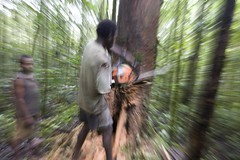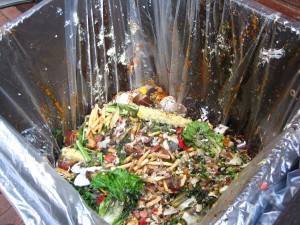 The poster child of human environmental destruction in the 90’s is still imperiled, even if the focus has shifted to global warming. Of course the two are intimately related, and besides the forests’ huge impacts on local watersheds—effectively creating their own rain—the forests’ trees and soils obviously have a major impact on the carbon cycle. Still, the onslaught upon the lungs of the world is not only unrelenting but expanding. Continue reading
The poster child of human environmental destruction in the 90’s is still imperiled, even if the focus has shifted to global warming. Of course the two are intimately related, and besides the forests’ huge impacts on local watersheds—effectively creating their own rain—the forests’ trees and soils obviously have a major impact on the carbon cycle. Still, the onslaught upon the lungs of the world is not only unrelenting but expanding. Continue reading
Category Archives: Food & Cooking
Environmental pawprints
Lest our dog-owning readers think that the above comic unfairly singles out their pooches, note that the original research it is commenting upon is not limited to canines. It turns out that a variety of pets have numerous, oft-overlooked consequences for the environment, be it illegal bird and fish trafficking, or the insistence that Fluffy should eat better than her owner. The latter is a rather disturbing and unnatural trend since undomesticated Felis and Canis eat as much of their prey as they can, offal and all. Indeed, one of the major impacts of free ranging cats is songbird predation.
Water pollution is another unfortunate side-effect of pets. Pooper-scooper laws are not just about aesthetics and clean shoes, but public and environmental health. Besides carrying a variety of pathogens, Spot’s spots are essentially fertilizer and can contribute to algal blooms and fish kills if they make it into water ways. It is especially important to clean up after your dog—and there are free baggie dispensers in case you forget to grab some on your way out—if you bring him to Fresh Pond, since this beautiful water body is an important wildlife habitat and a part of our water supply. Cat waste can also contribute to water pollution. Flushable litter has lead to the decline of Californian sea otters, and it can infect other wildlife as well e.g; filter-feeders such as oysters and clams. Other choices of litter are also problematic, although a variety of less harmful options are available.
None of this is to say that you should not have a pet, or dissuade you from pets in the future, but merely to add to the list of things you should consider before doing so besides whether or not you have the necessary time to devote to the pet’s care and convincing your landlord/partner to allow it.
- Adopt rather than buy, and if you’re leaning towards exotics be sure to purchase from a reputable dealer.
- Always spay or neuter.
- Keep Fluffy indoors, and clean up after Spot.
- Although Fluffy (arguably) cannot survive on bread alone, neither she nor Spot needs filet mingon or Patagonia toothfish
- If you keep fish, be careful with your aquarium plants to avoid contributing to the spread of invasive species such as Caulerpa taxifolia
Tobacco powered trucks?
 On their face, biofuels seem like a pretty good idea: carbon dioxide and sunlight in, carbon dioxide and energy out. Certainly some hobbyists manage to recover waste grease for use in diesel engines, but commercially the field has been dominated by the fermentation of sugars from food crops into ethanol. Unfortunately, due to the large petro-chemical inputs often employed it is unclear whether the result is a net gain. In addition, much attention has been given to the competing interests of fuel vs. food (vs. land conservation).
On their face, biofuels seem like a pretty good idea: carbon dioxide and sunlight in, carbon dioxide and energy out. Certainly some hobbyists manage to recover waste grease for use in diesel engines, but commercially the field has been dominated by the fermentation of sugars from food crops into ethanol. Unfortunately, due to the large petro-chemical inputs often employed it is unclear whether the result is a net gain. In addition, much attention has been given to the competing interests of fuel vs. food (vs. land conservation).
There is hope that research into the production of cellulosic ethanol, or alcohol from plant fibers, could soon tip the balance decidedly in favor of biofuels. One could use agricultural waste or fast-growing special cover crops however, this material should arguably be composted back into the fields… But what if you could make use of existing knowledge and agricultural land; instead of converting forest into sugarcane fields, or farming prairie? Perhaps even provide a competing market for an otherwise dubious product? This may be possible if research into genetically modified tobacco proves to be fruitful. These plants do not contain pesticide-producing or herbicide-resistance genes. Instead, scientists are working on ways to make the leaves of the plant express existing genes and produce more oil for use in fuel production.
Sustainable (sea)food

New Scientist has an interesting article on the “Five eco-crimes we commit everyday.” Most are not very surprising, but the details are interesting, such as the fact that the western world wastes one third of its food!
Egregious as this waste is, the means used to produce and procure much of our food is more important. To this end, Slash Food has a brief post highlighting some better seafood choices including local award-winning business Aqua Australis.
Also released this past week, a study of food sustainability revealing that, surprise of surprises, the devil is in the details and “food miles” are an over-simplification.
Green Holiday Guides
One of the coolest things about Thanksgiving? Unlike Halloween, it’s not about stuff. While Halloween wouldn’t be the same without candy, costumes, and décor, Thanksgiving celebrates giving thanks for what you already have. What a relief for your pocketbook and the planet. —treehugger
Free tickets for the Museum of Science
 CEA has received a number of tickets for free general admission to the Museum of Science, and is making them available to interested parties. They will be available for pick-up from CEA’s offices beginning at noon on Friday 9/25, which should be staffed until 7PM on that date. Note: The tickets expire Wednesday 9/30.
CEA has received a number of tickets for free general admission to the Museum of Science, and is making them available to interested parties. They will be available for pick-up from CEA’s offices beginning at noon on Friday 9/25, which should be staffed until 7PM on that date. Note: The tickets expire Wednesday 9/30.
Alas, this windfall comes a little late for you to catch Manufactured landscapes, and too early for Running the Numbers: Portraits of Mass Consumption. However, the museum has a number of other interesting exhibits—including several related to energy—as well as a special showing of the new film Food, Inc. on Wednesday at 2; advanced registration required.
The tickets were donated by The WhizKids Foundation, a Cambridge-based non-profit that works with local schools to improve STEM education.
The meat and climate debate

In a recent Washington Post article, the climate change debate was brought to a new level: what about meat? Politicians and environmental activists alike argue over cap-and-trade, mitigation, adaptation, and hybrid cars, but what about the energy used and green house gases (GHG) emitted from intensive livestock practices (factory farms) across the nation, and around the world? The Post article cited a 2006 United Nations report stating 18 percent of global GHG emissions comes from livestock. Never mind the hundreds of thousands of acres of land stripped and cleared for cattle-grazing in Brazil’s Amazon rainforest and the American West, to name just two major regions. The Amazon rainforest in particular acts as a major carbon sink on our planet, storing large volumes of CO2 from the atmosphere. Diminishing this capacity increases the precariousness of our situation.
So, is switching to a vegetarian or vegan diet all that impactful? Interestingly, a study out of the University of Chicago noted switching to a vegan diet is more environmentally friendly than owning a Prius. Still, not everyone is comfortable giving up meat in their diet. At the very least however, cutting back a little, or buying locally raised meat can cut emissions significantly, and promote local farm production and sustainability. So next time, take a second look at that hamburger you ate for lunch and think global climate change; they’re more directly related than you may think.
Recycling Soda Cans into Solar Panels

From Canada comes the rather amazing story of Cansolair, a company that reuses soda cans to make solar panels. Once installed, this soda/solar unit can provide up to 30% of the heating for your house. All this in the cloudy, foggy Labrador region. All without adding another CO2 particle to the environment. Maybe Coke knew it was onto something when they introduced this new flavor last year.
Check out this video to see how it’s done.
Diet for a Small (Hot) Planet
Don’t have the cash for a new hybrid? Did you know that you can reduce your carbon footprint by the same amount as driving a hybrid by simply eating less meat? Well, now you do.
In 1971 Frances Moore Lappé wrote the vegetarian best-seller Diet for a Small Planet which hi-lighted the agricultural inefficiency of meat eating. (On average, it takes eight pounds of vegetable protein to generate a pound of animal protein.) As global warming has become a hot issue, that agricultural inefficiency is being measured with a new yardstick— the carbon footprint of meat.
As the food writer Marc Bittman writes in the New York Times article Re-thinking the Meat Guzzler.
To put the energy-using demand of meat production into easy-to-understand terms, Gidon Eshel, a geophysicist at the Bard Center, and Pamela A. Martin, an assistant professor of geophysics at the University of Chicago, calculated that if Americans were to reduce meat consumption by just 20 percent it would be as if we all switched from a standard sedan — a Camry, say — to the ultra-efficient Prius. Similarly, a study last year by the National Institute of Livestock and Grassland Science in Japan estimated that 2.2 pounds of beef is responsible for the equivalent amount of carbon dioxide emitted by the average European car every 155 miles, and burns enough energy to light a 100-watt bulb for nearly 20 days.
Something to chew on, don’t you think?
